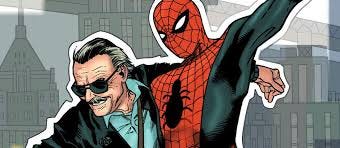
Anyone who has written with some modest degree of success eventually, inevitably, is asked how they got started, who inspired them.
My typical, and not untruthful answer, is that Stephen King is the first author who connected with me on such a visceral level I thought: How can I do that? I want to do that! (Without, of course, necessarily knowing what “it” was, or what it entailed.)
I can also point to early infatuations with, first KISS, and then The Beatles, as stimulating?—?or instigating?—?something inside, some impulse that went beyond enjoyment or excitement, and awakening an impulse that couldn’t quite be described (for all the right reasons, I hope, it still can’t be).
But if I’m honest, not to mention accurate, before Cujo and Ringo and Gene Simmons, my first hero was Spider-Man. As a gateway to reading, comic books were?—?and presumably still are?—?invaluable; a kid can do the work of learning how to process language while having fun. What a concept.

As such, Stan Lee is (no past tense necessary or permissible) an American icon, a national?—?scratch that, international?—?treasure, and a touchstone for the type of genuine optimism that the United States gets particularly nostalgic about during elections. Because super heroes are in short supply, particularly in politics, we keep electing people who would invariably be the bad guys in these old comics.
Listen: I did not linger long in the comic book universe; my nerd-cred is minimal, and by fourth grade I was already reading books my brain couldn’t quite process (for all the right reasons, I hope it still can’t). That’s not to say I outgrew comics, or left Spider-Man behind; just as I never (really) left KISS behind. Not unlike grown men wearing makeup portended my infatuation with the Fab Four, Stan Lee gave me the skills and confidence to begin tackling books that mirrored reality: sketchy characters abundant but heroes few and very far between.
(Aside: The Incredible Hulk was also indelible, and it was in those comics that I remember first seeing issues of social justice?—?or simple unfairness?—?depicted in ways that were seldom heavy-handed, but unmistakable. In fact, in case I need to establish any geek bona fides, I still get emotional recalling the issue that featured “Crackerjack Jackson.” I couldn’t tell you what happens (though I’d love to see a copy, preferably a physical one, and refresh my memory), but there’s an enduring image of Jackson?—?a poor and persecuted black man?—?sharing a modest dinner of baked beans, over a campfire, with Hulk: two outcasts commiserating and comforting one another.
Okay. Real-time update. The Internet remains the gift that keeps giving.
Spoiler alert number one: Jackson teaches his new friend how to write his name. Spoiler alert number two: Crackerjack dies, and as an eight-year old, I wept while reading. I’d still cry today, undoubtedly (real-time update: it’s very dusty in here).

What lingers is not needing to know how he died; what matters is that his death was unexpected and, if I came to recognize the convention of sentimentality and the short-cut of killing off characters to expedite empathy?—?and advance the plot?—?I look back and understand Lee wasn’t doing anything Tolstoy, Dickens, or Plato didn’t do many years before him. This experience, to belabor the point, was an early and, clearly unforgettable, introduction to compassion; a sensitivity to immutable realities like death, prejudice, and unfairness. Stan Lee, in short, was helping prepare me for the real world before I even knew what it was. That’s why he was?—?and will remain?—?a personal hero to myself and many, many (many!) millions.)
My earliest attempts at fiction may have been earnest attempts to copy The King (actually, my first stories and poems were more or less plagiarized from Edgar Allan Poe), but before that, I drew pictures. I emulated, I aspired. I was inspired. I still am. I depicted the world I wanted to live in, and through that simple act of hope and faith, I created it. So did Stan Lee.

